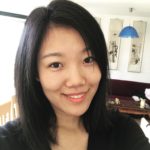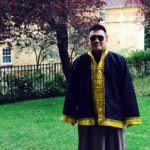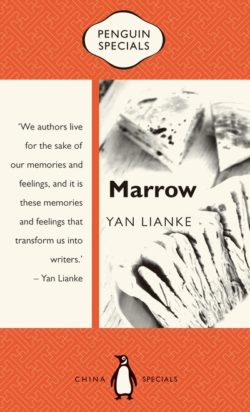Marrow by Yan Lianke
(Penguin China, 2016)
Publisher's Blurb
In a small village deep in the Balou Mountains, Fourth Wife You despairs of what the future holds for her four mentally-impaired children. A cure for the family curse appears, but it will extract a price so primal and complete that no one can be expected to make it except, perhaps, for a mother. A chilling and relentless tale of family responsibility and a mother's sacrifice, Marrow is Yan Lianke at his best.
Reading Chinese Network Reviews
reviewed by Yue Xin, 9/2/20
 Yan Lianke’s Marrow has revealed a tale of grotesque cannibalism in a small village deep in the Balou Mountains. Under Yan’s pen, we’ve discovered a countryside world full of despair and hope, reality and mystery, struggle and compromise. The novella doesn’t focus on the grandiose narration but portrays a surreal story of an individual family - Fourth Wife You and her four mentally challenged children.
Yan Lianke’s Marrow has revealed a tale of grotesque cannibalism in a small village deep in the Balou Mountains. Under Yan’s pen, we’ve discovered a countryside world full of despair and hope, reality and mystery, struggle and compromise. The novella doesn’t focus on the grandiose narration but portrays a surreal story of an individual family - Fourth Wife You and her four mentally challenged children.
Fourth Wife You despairs of what the future holds for her children. As a widow, her life is a total struggle – to bring up the children with hereditary disease transmitted from their father You Stone. As a mother, she has taken on too much of the responsibilities of life; and in the end, she even has to sacrifice her own life to cure this family’s curse.
This novella is full of magic realism and surrealism, slowly unfolding in a beautiful but shocking way. When Fourth Wife You has found out that the only way to completely cure her children’s disease is to feed them with marrow soup from the bones of the kin and the “closer from the kin the better”, she doesn’t hesitate for a moment to boil the bones of her late husband and of herself.
In the novella, there is another eerie and romantic plot, just like the film Ghost, Fourth Wife You can see and directly communicate with You Stone, who has committed suicide because of the fear of responsibility and trouble. Perhaps out of guilt, after You Stone’s dead, he keeps helping and comforting his wife to change the destiny of the family, like a saviour. You Stone, as a ghost, also becomes a part of the narration that attracted readers to enter an epic and engaging world.
After closing this little book, one last scene cannot be removed from my head for a long time. It was during Fourth Wife You’s funeral, when her four cured children can’t stop crying. Although having become a ghost herself, Fourth Wife You says her one last sentence, “This illness is hereditary. Do all of you know how to treat your own children?”
For many Western readers, this ending might sound horrid and absurd, even brutal. For Chinese readers, it is not difficult to understand You’s decision and the ingrained motivation behind it. Filial piety has been considered as the most arguably moral tenet in the Confucius philosophy. It doesn’t only mean that the young should look after the old, also states the purpose of the family: continue the family line. Only when You’s children become “wholers” that they can be burdened with more obligations.
I would suggest western readers regard Marrow as an “appetizer” because Yan has prepared more exciting “main dishes” if they are interested in dissident literature. Yan Lianke has been considered as one of the most satirical writers who criticise China in a brutal way, which made many of his works banned in his motherland. His insight comes from his brutal background – having lived through the Great Leap Forward, Three Years of Famine and the Cultural Revolution. In Marrow, although it’s difficult to notice the tints of political metaphor or sociological analysis, one can still enjoy the mordant straightforwardness and mythical imagination. After all, we need someone who lives and can tell the tale.
Reviewed by Yue Xin
Reviewed by Henry Yunwei Wang, 25/2/18
 Renowned, yet censored, Chinese novelist, Yan Lianke, was born in a rural village of northern province Henan in 1958. Yan's writing career started early in his 20s, first as a military propaganda writer since his impoverished family would never have been able to send him to a university rather than the army. From the period of political turmoil to that of the market economy, from the full bloom of cultural deprivation to the censorship of journalism and art, Yan did not rest his trusty pen during these sixty years, to portray line after line of ordinary Chinese characters who represent the opposite of what has been promised by the slogans, a rather biting satire of life. When I first read his novella, Marrow, from the first page to the end, I immediately felt that this was a real author, that is a gentleman of true virtues like the ancient 士.
Renowned, yet censored, Chinese novelist, Yan Lianke, was born in a rural village of northern province Henan in 1958. Yan's writing career started early in his 20s, first as a military propaganda writer since his impoverished family would never have been able to send him to a university rather than the army. From the period of political turmoil to that of the market economy, from the full bloom of cultural deprivation to the censorship of journalism and art, Yan did not rest his trusty pen during these sixty years, to portray line after line of ordinary Chinese characters who represent the opposite of what has been promised by the slogans, a rather biting satire of life. When I first read his novella, Marrow, from the first page to the end, I immediately felt that this was a real author, that is a gentleman of true virtues like the ancient 士.
Including Marrow, Yan’s novels and novellas are nothing short of masterpieces. Beyond that, he is no stranger to China's censors, keeping his satirical eye on China’s rapid growth in this surreal fantasy. From his first novel in 1994, Yan has been consistently treading on the bureaucrats' toes: on the taboo topics of both communism and capitalist excess, the Cultural Revolution, military corruption, transformation of villages into mega-metropolises, blood sales, AIDS and SARS epidemics, etc. Like a Roman gladiator, lonely but not alone, with little compromise and facing clear condemnation, Yan battles with toning down his satire, but leaving his talent unfettered. The fortunes of his literary works at the hands of the censors were mixed: some were published in mainland China, watering down the controversial sections, others were withdrawn but were published in full abroad outside the censor's grasp.
The aim of propaganda, censorship and rewritten histories have been trenchantly explained by the political philosopher Hannah Arendt: it is to confuse: to breed a combination of cynicism and gullibility. Without reality- grounded facts, people may be easily left unmoored, picking and choosing at random what pieces of information to believe, building hopes on imagination or any doctrine.
In this scenario, the challengers in China's cultural industries who dare to navigate these topics can be divided into some four distinctive groups: ousted rebels due to various reasons; altisonant social activists who are in fact sneaky profit-driven speculators; writers and artists who failed to build reputation in their own fields yet wish to please and shock international audience with loud hypocritical claims, applying the old technique of "田忌赛马" under the table (Tian Ji’s horse racing strategy involves a one-to-one contest between two sets of racing horses within a disjointed stratification of speed classes), which actually destroys the spirit of the contract. Yan Lianke could be a perfect example of this last type this self-censored Chinese male author, whose manners of self-censorship and writing of conscience, always reminds me of Aristotle's "eudaimonia" and Confucian's "内圣外王" (internal sage and external king).
This 100-page-long novella, Marrow, with a writing style which is simple and straightforward, this Penguin Specials can be completed in one sitting by most people. In Marrow (Balou Tiange 耙耧天歌) there slowly unfolds a rather bizarre tale of cannibalism in a small village in the Balou Mountains. In the story the protagonist Fourth Wife You, a mother, struggles to marry off and otherwise look after her four grown-up, mentally challenged and epileptic children. In order to cure the psychiatric illness of her children, You takes extreme measures, feeding them a medicinal soup made from the bones of her dead husband. Firmly believing in bones that are "the closer from kin the better," You finally dismembers herself, using a butcher's cleaver. In the very last moment of her life, You still worries her future grandchildren may suffer from a hereditary illness.
The story of an endless love and sacrifice of a mother also features a hen-pecked ghost of You's husband You Stone, who had committed suicide two decades earlier, and her impudent third daughter and third son in-law who are selfish and greedy. The tale has been brilliantly translated by Charlos Rojas. It may first read as being superstitious, weird and creepy -- Western readers in particular may consider it surreal. It may also recall the "bun dipped in human blood" of Lu Xun's novella Medicine (Yao 药), but I've never read nor heard that this sort of cannibalism ever happened in China. Without attempting political or sociological analysis, from my point of view, its grotesque nature is a symbolism of the parental relationship especially in rural Chinese villages.
China has 950 million citizens who live in rural villages. As expressed in old saying "raise sons/daughters for security in your old-age" (yanger fanglao 养儿防老), which equates to the fulfilment of one's duties to support elderly parents with virilocality, Chinese parents devote and sacrifice all their wealth and whole life not only to raise their children to adulthood, but also to help marry them off.
The excessive demands of children for parents' wealth and caring in reality, could all find their equivalent in the third daughter and in-law "Wu Shu emptied the family house", the soup made of bones from "close skin" in Marrow.
In traditional Confucian values, filial piety is essential but the daughters and in-laws show very little vis-à-vis their selfless mother. Yan Lianke emphasizes that "everything is tragic," but Marrow does not try to rouse the reader's pity; the author rather elaborates with an objective of social criticism but he remains an objective observer, not trying to stir emotion. Disability and hereditary diseases are at the heart of many of Yan's works, be it the morbid and slow-killing parent-child relationship of excessive demand and supply. The mother who, with her body, provides the solution but at her funeral at the end of this fable, warns: "this illness is hereditary. Do you all know how to treat your own children?"
To create a happy ending not in the story but in this review, I particularly appreciate Yan's writing in Henan dialects and the fine interpretation of it by the very talented translator. For those who are interested in Chinese modern writing that features in dialects, I recommend Yan's other works The Sunlit Years 日光流年, Solidity of Water 坚硬如水and The Joy of Living 受活; and also novels by other authors like Jia Pingwa 贾平凹 and Chen Zhongshi 陈忠实in Shanxi dialect, Liu Zhenyun 刘震云 in Henan, Jin Yucheng 金宇澄 in Shanghai, and Yan Ge 颜歌in Sichuan.
Reviewed by Henry Yunwei Wang
Reviewed by Tamara McCombe, 13/9/17
 The translator Carlos Rojas of the English edition chose not to literally translate the title of Yan Lianke’s novella, which would have been ‘Song of Balou Mountain’, instead he draws out the text’s eerie theme of the inner most core of the human body, bone marrow. This is not a text you ‘enjoy’ in the pleasant sense. It is subtly, detachedly and realistically gruesome. Very few characters are given individual names, instead the protagonist is referred to as ‘Fourth Wife You’ and her children, ‘First Daughter’ to ‘Fourth Idiot’, depending on when they were born into the family. Hence the reader cannot even attach themselves to the characters. The lack of human or geographical names is an example of Yan’s well-known and self-criticised self-censorship. Having worked as a government propaganda writer and had works banned in Mainland China, the author knows only too well that too much blatant negative comment in literary works on his homeland leaves him unpublished. Despite these two points it surprised me how gripped I was to turn on to the next page.
The translator Carlos Rojas of the English edition chose not to literally translate the title of Yan Lianke’s novella, which would have been ‘Song of Balou Mountain’, instead he draws out the text’s eerie theme of the inner most core of the human body, bone marrow. This is not a text you ‘enjoy’ in the pleasant sense. It is subtly, detachedly and realistically gruesome. Very few characters are given individual names, instead the protagonist is referred to as ‘Fourth Wife You’ and her children, ‘First Daughter’ to ‘Fourth Idiot’, depending on when they were born into the family. Hence the reader cannot even attach themselves to the characters. The lack of human or geographical names is an example of Yan’s well-known and self-criticised self-censorship. Having worked as a government propaganda writer and had works banned in Mainland China, the author knows only too well that too much blatant negative comment in literary works on his homeland leaves him unpublished. Despite these two points it surprised me how gripped I was to turn on to the next page.
Yan Lianke’s novella Marrow lays out the tale of a widow, ‘Fourth Wife You’, in rural China giving her utmost to do the best by her four mentally handicapped children and ultimately continue the family line. Psychological dysfunction in people, so traditional Chinese culture says, manifests itself as a result of past family wrong doings. Hence, why individuals inflicted with such conditions can in Chinese society be cause for loss of face to a family and why Fourth Wife You’s husband, consumed by guilt, commits suicide. Alone, Fourth Wife You toils, literally shedding sweat and blood, in the fields to fill her children’s mouths and crosses many li to find each of her brood the best partner to marry given their financial and psychological limitations.
Yan is lauded internationally for his masterly ability to adopt different writing styles in each of his works. In Marrow, Yan brutally contrasts Romanticism in his picturesque descriptions of the idyllic rural landscape and uses the lyrical descriptions of the change in light to portray the passing of time with the Realism of hard physical labour and emotional anguish of rural dwellers.
The Beijing-based, Henan-born, author has said his home and heart are in his childhood province, not the city. Where city dwellers might look down upon the country folk in the story for their superstitious and simple ways, Yan’s portrayal of the unwaveringly determined Fourth Wife You shows his deepest respect for them. In an interview Yan is quoted saying “The peasants are like that. When disasters strike, they will suffer for a few days and then they will ‘accept their fates’, they will endure and they will try their best to face reality and daily life again. This is their instinct to live, and it is their spirit to live. This ability to live is something that urban dwellers and intellectuals cannot possibly have, and it is a worldview that their forebears left them over the many generations.”
At the same time, he is all too aware of the backwardness of the countryside and its abandonment by the cities. The characters are portrayed as animalistic and savage. Frequently, Yan likens Fourth Wife You’s children to animals, whether it be by comparing their bite marks in food to fang-like holes or endowing Fourth Idiot with zoophilic predilections. Animal bones in traditional Chinese medicine are lauded for their powers to cure illness. Knowing this, in desperation to cure her children and settle her family’s past wrongs, Fourth Wife You ultimately realises medicine made with the bones from the most complex of animals, the human, is the answer. A sinister air hangs over the novella from page one and the outcome is somewhat predictable but it is the foreboding of the latter which compels the reader on.
Being a novella, the reader is fortunately not forced to read late into the night to discover the characters' fates. The story is too unnerving to enjoy as such but it is certainly entertaining.
Reviewed by Tamara McCombe

